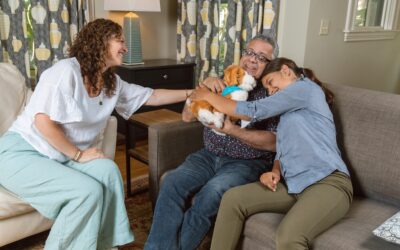Pets found to deliver significant health benefits to the lonely
They also found that the presence of pets, whether real or robotic, helped participants’ subjective well-being. “I got a lot of pleasure out of the program, and Barney being there, of course, but I liked [the robotic pet] the best … I get very lonely here, so the...
Joy for All Impact and Benefit by Ageless Innovation
The following white paper is a summary of over 10 research studies and the thematic results coalesced from them. Findings include reduced feelings of depression, isolation and loneliness; reduced use of medication; increased cognitive activity; increased feelings of...
Older age, depression, loneliness all contribute to significant risk for dementia, cognitive decline
Older age, the onset of depression and increased loneliness can significantly contribute to the risk of dementia and cognitive decline, according to two separate studies.
Loneliness, social isolation, living alone are ‘significant’ risk factors for older adult mortality, study finds
Loneliness, social isolation and living alone are significant risk factors for mortality, particularly in older adults, according to the results of a new study. Researchers from Greece, Italy and Canada analyzed 86 previous studies to quantify the relationships...
Effects of a robotic cat on agitation and quality of life in individuals with dementia in a long-term care facility
Read the study Abstract Study Objective The purpose of this study is to determine whether introducing a robotic companion cat into a long term care facility may improve affect and, subsequently, increase participation for residents with dementia, and to determine...
The Impact of Robotic Companion Pets on Depression and Loneliness for Older Adults with Dementia During the COVID-19 Pandemic
Abstract Purpose Differences in depression and loneliness, during the COVID-19 pandemic, for older adults with mild to moderate dementia living in residential care after interacting with a robotic companion dog or cat were explored. Experiences of family members and...
Implementing Affordable Socially Assistive Pet Robots in Care Homes Before and During the COVID-19 Pandemic: Stratified Cluster Randomized Controlled Trial and Mixed Methods Study
Abstract Background Robot pets may assist in the challenges of supporting an aging population with growing dementia prevalence. Prior work has focused on the impacts of the robot seal Paro on older adult well-being, but recent studies have suggested the good...
Using Robotic Pets to Improve Interactions, Behaviors, and Quality of Life, While Reducing Anti-psychotics in Hospice Dementia Patients
Categories Reduce Social Isolation Reduce Feelings of Loneliness Reduce Use of Antipsychotics and other Medications Increased Quality of Life Others: Decreased Agitation; Increased Cooperation with Activities of Daily Living Organization Name Alacare Home Health and...
User-Centered Design of Companion Robot Pets Involving Care Home Resident-Robot Interactions and Focus Groups With Residents, Staff, and Family: Qualitative Study
Abstract Background Globally, pressure is increasing on health and social care resources due to the aging population and growing prevalence of dementia. Companion robots, such as Paro, demonstrate strong potential for helping reduce this pressure through reported...
LEARN MORE









